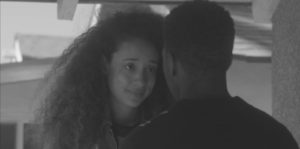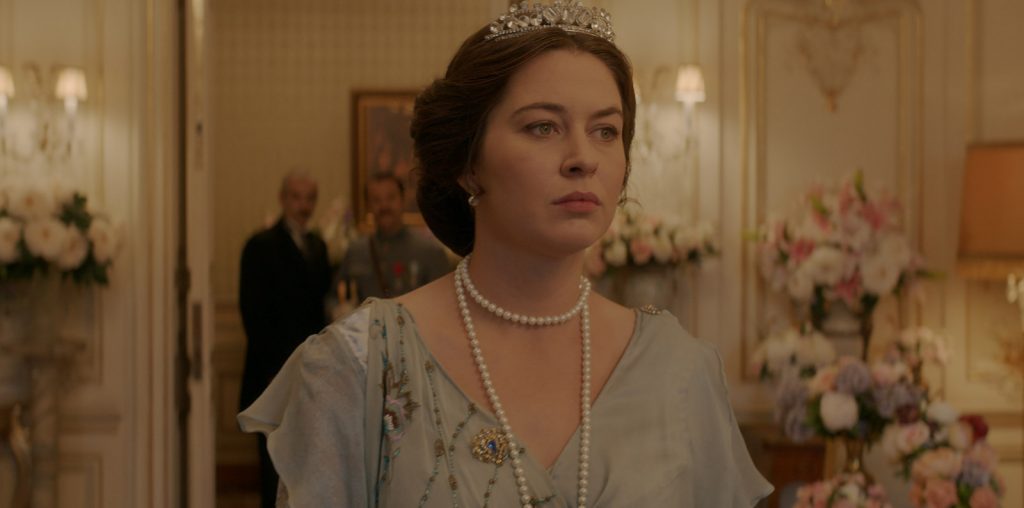
I ask this because Randall has a strong backdrop for his behavior. In context to the film’s subject, I guess his antagonistic behavior towards his son comes from trauma, and that trauma is being involuntarily passed on to his son, Mickey. It’s as if he has been through a similar treatment in his youth.
David: Yeah, you know, deep down, I believe that Randall was genuinely coming from a place of love. He may have regretted having kids because it messed up his football career or whatnot. But deep down inside, he was a father, protective of his family, and he didn’t want Mickey to grow up as harshly as he did. He didn’t see the drawing and whatnot as a way out of that lifestyle. And to me, that makes what happened, in the end, blows everybody’s mind. It shows more so how just like mentally unstable Mickey was in mind to go back and, you know, do what he did. Yeah. But, you know, coming as a Black man, and maybe Marcellus and Rashad understand this too, our fathers are hard on us. They’re not necessarily physically as hard as Randall was to Mickey. But, you know, growing up, I got spankings and all that kind of stuff. And to this day, I’m grateful because it made me a much more disciplined person growing up. So, yeah, deep down inside, Randall cared for Mickey. And it just came out in a way that wasn’t as positive as it could have been.
Marcellus: The way I’ve always looked at the random character was the way that David explained it. He was never meant to be an antagonist or a protagonist. He was just what he was. He was just an individual who was going through a hard time. He didn’t know how to translate that to his family. Because there are many fathers like that, my father was that. You see, he was a good man. He worked hard, busting his a*s every day. But there were times when he was this aggressive yet protective guidance he gave; he lived in a time where everybody had to be realistic. You don’t have the option of wanting to be an artist. So he said, “You’re not going to be an artist on my time when I know that you need a job to have a nine to five. I’m not going to take care of you, fam.” That’s most black men’s mindset, especially from that time. So that was how I’ve always looked at the character regarding Randall.
Randall was never meant to be a villain. He was never meant to be this evil gargoyle that everybody wants to point him out to be. And I’ve always pointed him out as my favorite character because he was what he was. He was a protector. He probably didn’t go about it the best way. But you can see that there was love there. You can look at it from the perspective of seeing where the teacher brought young Mickey home. And he asked him, “Did he touch you?”. And he’s asking that from a caring perspective. However, he may have had a little better. You can tell that that’s a father who loves his son. He’s just very stern because that’s the way he was raised. It was generational trauma that was passed on. And you saw it in Mickey towards the end.
“…this trauma has been ignored because we’ve been taught, as most black men, to ignore it.”
Rashad: It’s a testament to how talented our cast is, you know, just being able to play off David, playing off of everyone else and what these guys brought to the characters. It helped me, as Mickey, find that subtext, depth, and nuance of who he is.
This is something that I highlighted in my review – that there is a possible connection between the mental state of Mickey or his father’s behavior and the systematic oppression against the Black community. Is there something personal, from life experience, that got embedded into this notion as addressed in the film?
Marcellus: I say yes, and you see it on display from the perspective wherein Mickey is screwed at work or just from the issue he dealt with as a child. These are all things that have happened systematically over time to most black people, most black men in general. And then you add in all of the other perspectives of being at home. So all of this, this trauma has been ignored because we’ve been taught, as most black men, to ignore it. Basically, you kind of have to go off and just kind of suck it up.
And we’re now in a day and age where more people are coming to grips with it. But that was what it was back in the day. So you’re seeing a new generation of people addressing the issues that are making it well known. I’m glad that we were able to showcase those issues because these are what real black men are dealing with in general, or women in general, but particularly black men. We’re often perceived as the most dangerous species because everybody is looking at us as, I guess, at the forefront of everything you would call negative, but doesn’t understand the perspective of what it is to be a black man every day. That was something that I wanted to highlight and showcase. And we did that with every single frame of Mickey’s life.
David: Well, I’m just piggybacking on that. I think that even more shows the mental instability that Mickey has going on because, as Marcellus said, we deal with stuff like that all the time, but we don’t go around; a lot of us don’t go around killing people. That shows that something brewing in Mickey’s head triggered him even more to do that.
And that’s something that is not talked about in the black community, hardly ever, you know, and that’s the great thing about this film that it has opened a lot of dialogue towards, you know, mental illness in the black community. I’m happy to be a part of a project that starts a dialogue in an area we need to discuss.

